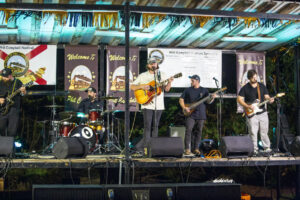A Tuesday morning gone berserk
By By Buddy Bynum / editor
July 13, 2003
A gleaming moon broke through party cloudy skies Thursday night, about 60 hours after Lockheed Martin's plant in Lauderdale County was rocked by 10 minutes of violence. Ten minutes 600 seconds in a county whose history spans 170 years.
No, we won't be defined by such a scant stretch of mortal time.
Given the violence that took place at the Lockheed Martin plant on Tuesday, and the carnage left in its wake, the moon seemed peaceful, serene, a constant reminder that God is in Heaven and life for most of us goes on.
For the families of Mickey Fitzgerald, Sam Cockrell, Lynette McCall, Thomas Willis, Charlie Miller and Doug Williams, however, life is forever altered. Wives lost husbands. A devoted husband lost a loving wife. Children lost fathers.
And in some ways this community lost its innocence, a naive belief that nothing like this could ever happen here. Tragically for all concerned, at about 9:43 a.m. on Tuesday, July 8, 2003, it did.
One heavily armed gunman, dead; five working people with good jobs trying to make a living, dead; nine of their co-workers, wounded.
Lauderdale County Sheriff Billy Sollie said at one of his news conferences there is no compelling evidence at this point to suggest that Williams aimed his 12-gauge shotgun and repeatedly pulled the trigger due to the race of his targets. The record shows that four of the dead were black Cockrell, McCall, Willis and Miller; five of the wounded are white Brad Bynum (no relation to this writer), Chuck McReynolds, Henry Odom, Randy Wright and plant manager Steve Cobb.
One of the dead was female McCall; seven of the wounded are male. No white women were among the victims.
Of the dead, Willis had been employed by Lockheed Martin virtually since the company located here in 1969. After previous service with the company, Miller had been re-hired just four months ago.
Of the wounded, Odom and Scott have been employed at the facility for 33 years; Bynum joined the company less than six months ago.
A troubled man
Sollie's deputies and agents from other law enforcement agencies are re-interviewing witnesses and co-workers in an effort to determine what set Williams off and how he picked his targets.
Clearly, Williams was a troubled 48-year-old American male, described by his girlfriend as "a man pushed to the point that he broke," who took out his frustrations on 14 co-workers before he took out the only person who could ever possibly explain why he did what he did himself.
Outside a Thursday memorial service at First Baptist Church, Shirley J. Price, his girlfriend, said Doug Williams, the man who did the shooting and killing, was taking medicine for depression and high blood pressure.
He evidently had not grasped the intent of an anger management course he was compelled to attend in 2001 by Lockheed Martin management, who said they had been monitoring his behavior for a year. Documents in Lauderdale County Chancery Court suggest that Williams' anger may have been an element in his divorce 14 years ago.
While the investigation into his motivations may take months, according to Sollie, most independent observers would have to conclude that Doug Williams was a deeply troubled man who acted on the frustrations of his life. And for those 600 seconds of violence, he will forever and rightly be branded a killer.
Monster of racism'
As members of our community gathered at a memorial service, reflections on racial relationships took center stage. The most compelling statement came from the Rev. Bill Harper, pastor of Savannah Grove Baptist Church and director of the Multi-County Community Services Agency.
We in the media are reporting what people tell us in this case in many, many interviews with Williams' co-workers at Lockheed Martin and others who knew him. The media is also reporting what people who knew Williams said was anger directed, perhaps indiscriminately, at both black people and white people and corporate management. To me, all of this is food for thoughtful analysis before anyone rushes to judgment on his motivations.
Harmony is an element of life to be cherished in any community, including ours. Here in our community people of all races need to talk more to each other outside the glare of a memorial service. We should renew our personal efforts to get to know each other better as friends and neighbors, share a cup of coffee and a meal.
Whether Williams' acts constitute a hate crime, perhaps, will be determined by the investigation into the events of a Tuesday morning gone berserk July 8, 2003.
A continuing dialogue on the nature of race relations in our community is a healthy thing. Given what we know so far, it would be a mistake to say that Williams' rampage was motivated solely by race.
The next chance you get, pick a clear night and go outside. Look up at the moon and know that its comforting light still shines down on all of us.










